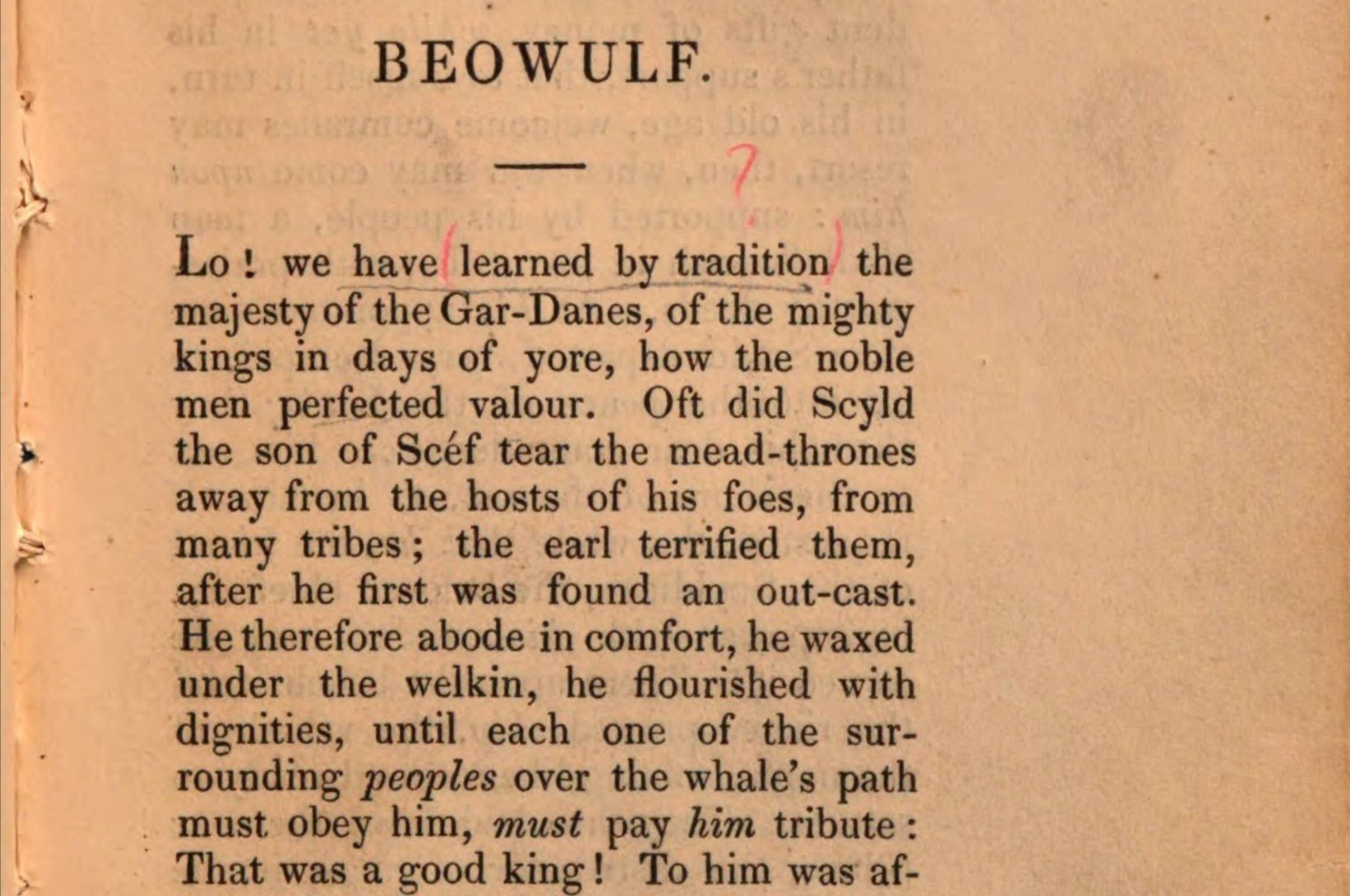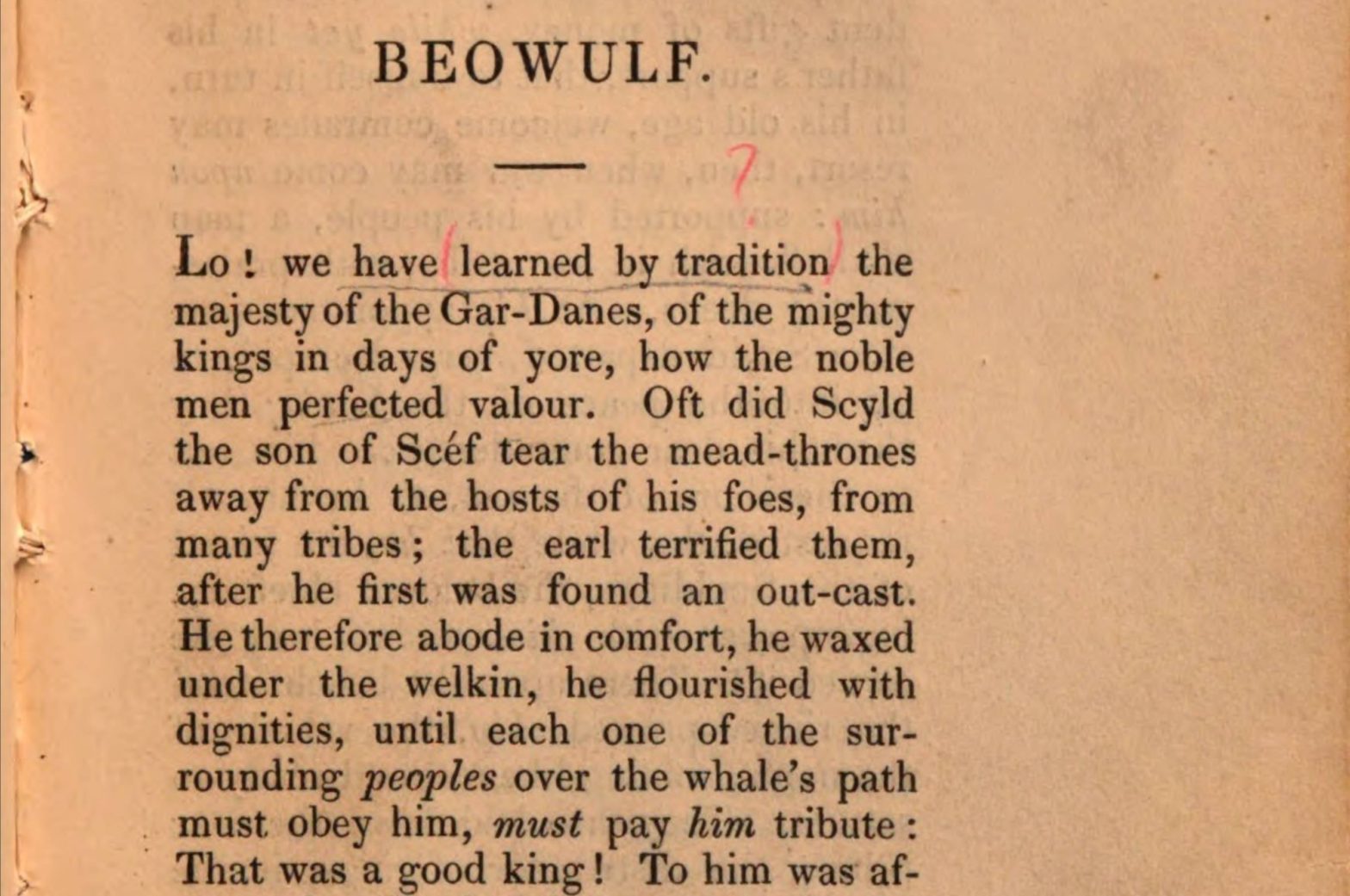Toen ik Beowulf aan het lezen was in een nieuwe vertaling, was ik benieuwd naar oudere vertalingen. Ik keek op de wikipediats, en die zei me dat de oudste vertaling naar modern Engels door John Mitchell Kemble was, in 1837. Het internet zijnde wat het internet is, is het tegenwoordig bijna evident dat dat boek ook online te lezen is — en jawel: alhier staat het boek. De vertaling van Beowulf staat in v2, en ik heb er niet meer dan een paar pagina’s van gelezen, maar er zijn inderdaad veel betere vertalingen.

Wie er zelf aan wil beginnen, trouwens: dit is een fantastische bron van informatie, met de originele tekst, voor elk woord een vertaling, grammatica, en alles.
..maar dat geheel terzijde. Vóór Kemble’s vertaling van Beowulf in deel twee van The Anglo-Saxon poems of Beowulf, The Travellers [Widsið], and The Battle of Finnesburh staan 56 bladzijden “Postscript to the Preface”, waar Kemble zijn beklag doet dat hij in het voorwoord van het eerste deel van zijn werk niet genoeg plaats had om te zeggen wat hij wou zeggen, en ook dat hij het toen heel erg druk had, en oh ja ook dat zijn bronnen “laborious as they are, are subject to one serious reproach: they treat mythic and traditional matters as ascertained history”.
Euh tja. Redelijk fundamenteel probleem, zou ik zo zeggen, ervan uitgaan dat mythes en overleveringen 100% historisch zijn. Maar hey, Kemble, daar zei recent iemand niet voor niets over “best described as an independent scholar of determination and energy but not means”.
En dan leest ge door die hele boterham vol zaken die tegenwoordig ongetwijfeld al allemaal totaal anders bekeken worden, en zit het leutigste in de staart. Helemaal op het einde van zijn postscript to the preface staat dit — ik kopieer het volledig, ’t is té grappig:
I wish I could have closed this preface in peace and charity with all men, but it could not be so: a pamphlet has appeared, directed in the most personal and offensive manner against myself, but not confining its attacks to me: the profound contempt which, as scholars and men, both Mr. Thorpe and myself entertain for this production and its author, would but for one assertion made in it, have caused it to remain unnoticed by me, especially as the tone and style in which it is written are its own all-sufficient condemnation. This pamphlet cunningly circulated from Oxford, dated from Oxford, but printed in Holland, contains a statement so seriously affecting the honesty of a great man, as to leave me no discretion as to whether it should or should not be noticed.
It is stated by the author, that having in a conversation with James Grimm learnt that I was personally unacquainted with him, (a fact perfectly true two years ago, although we have been for nearly five years on terms of confidential correspondence, a fact moreover which the presumed writer of the pamphlet learnt from myself in Cambridge), he put to Grimm the following consistent and logical query, “Why then do you praise him?” To which Grimm answered, “Why, he has praised me, and one hand washes the other, one good turn deserves another.”
Although, knowing my friend’s short way of dealing with impertinent coxcombs, I thought something of this kind might have been said, but assuredly not in the sense attributed to it, I felt it my duty to myself and Grimm to tell him what was reported of him, especially as I very much, and very justly suspected, that the pamphlet would not be sent to him. His indignant denial of ever having held any such conversation as that attributed to him, was received by me in London, and was voluntarily repeated by him to me this year in Göttingen. The motives of this scandalous fabrication lie open to the sun: with the pamphlet and its author I have now done, and can only regret that his forged dates should have so long imposed upon me, most of all that they should for a while have caused me to entertain an angry feeling towards some of my fellow-labourers in Oxford; they have the fullest apology from me for my error.
Be the author of the pamphlet a layman or a clergyman, be he a disgrace to Oxford or to Cambridge, I will give him one piece of advice, to remember that it would have better beseemed him, instead of vapouring about Christian feelings, to have acted up to that Christian law which declares “Thou shalt not bear false witness against thy neighbour.” From henceforward he stands stamped as a calumniator and a slanderer in the opinion of all who prefer the open assertion of an honourable, upright, and most distinguished man, to the underhand insinuations of a malicious, anonymous, and most ungentlemanlike scribbler.
Munich, Nov. 1835.
Dus iémand heeft gezegd dat Grimm alleen maar positief was over Kemble omdat Kemble iets positiefs had gezegd over Grimm, dat op een pamflet gezet en dat pamflet verdeeld. En Kemble was daar zó van in zijn gat gebeten dat hij heel het verhaal moést in zijn boek zetten.
Ik ben enorm benieuwd naar de rest van het verhaal.

